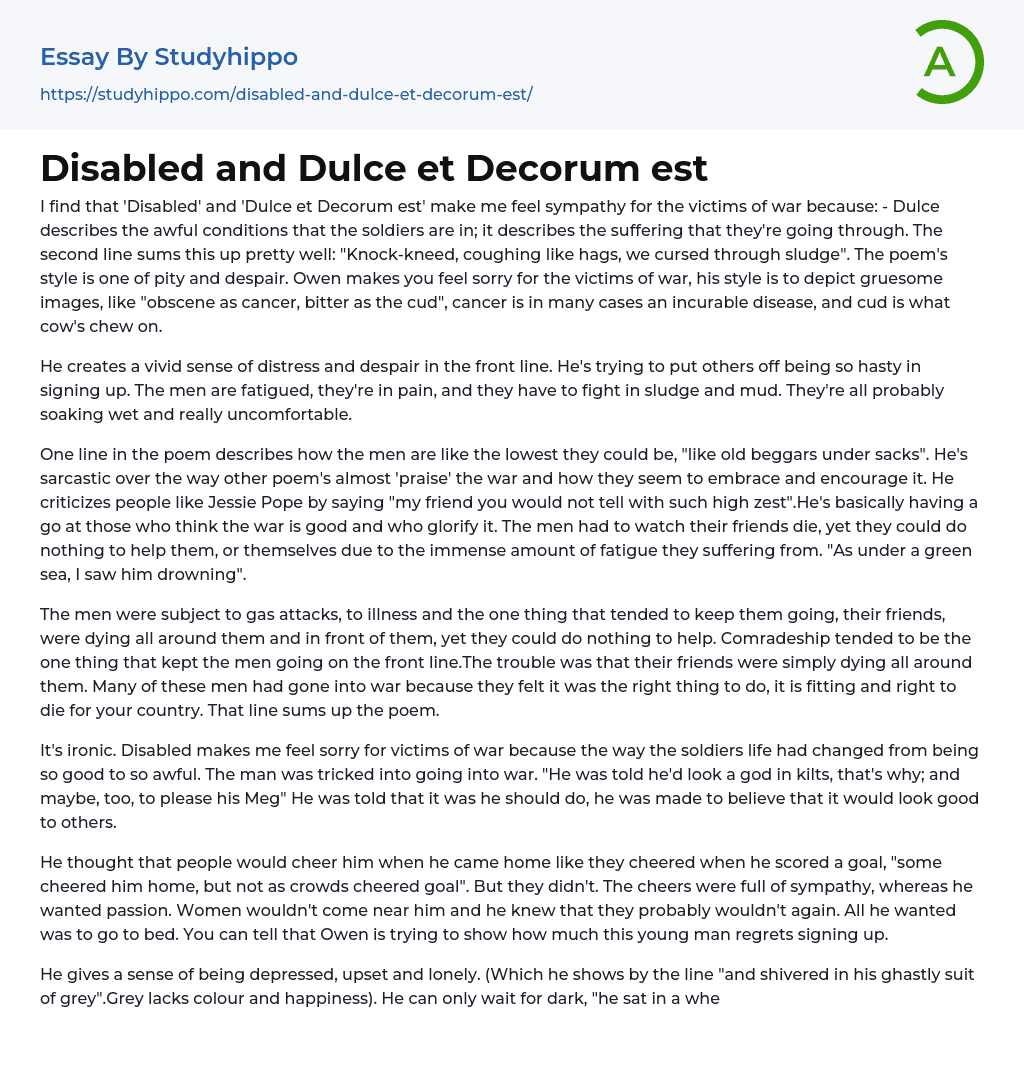When I read 'Disabled' and 'Dulce et Decorum est', I experience empathy towards war victims. In 'Dulce', the soldiers' wretched conditions and their suffering are vividly portrayed. The second line, "Knock-kneed, coughing like hags, we cursed through sludge", effectively captures their plight. Owen's style in the poem is marked by compassion and hopelessness. He evokes pity for the casualties of war through his portrayal of ghastly imagery such as "obscene as cancer, bitter as the cud". The comparison with cancer, an often incurable disease, and cud, the substance cows chew on, is particularly graphic.
Through his portrayal of the front line, he instills a palpable feeling of distress and hopelessness, dissuading others from joining too hastily. The soldiers are exhausted and in agony, forced to battle their way through thick sludge and mud, inevitably saturated and e
...xceedingly uncomfortable.
In the poem, the speaker uses sarcastic language to criticize the glorification and encouragement of war in other poems, such as those by Jessie Pope. Specifically, he notes how these poems praise the war and those who participate in it. Instead, the speaker portrays the reality of war, describing the suffering and helplessness of soldiers, such as their immense fatigue and inability to assist their dying friends. He uses vivid imagery, such as comparing the soldiers to "old beggars under sacks" and describing a friend drowning "under a green sea."
Despite being subjected to gas attacks and illness, the soldiers on the front line found solace in their comradeship. However, their friends were dying in front of them and they felt helpless to intervene. These men had joined the war with the belief that sacrificing themselves for their
country was just and honorable, as the poem's famous line suggests.
It's ironic that being disabled evokes sympathy in me for war victims. This is due to the drastic changes in the soldiers' lives, from being great to terrible. The man was deceived into going to war. He was informed that it would be a good idea for him to do so, and he believed that it would make him look impressive in a kilt and please his partner Meg.
Owen depicts the regret of a young man who had hoped for passionate cheers upon returning home, similar to those he received when he scored a goal. However, the reality was different, as the cheers were merely sympathetic. To add to his dismay, women kept their distance from him, leading him to believe that they probably would not approach him again. Ultimately, all he desired was the comfort of his bed.
Owen conveys a feeling of depression, sadness, and isolation through the line "and shivered in his ghastly suit of grey," which symbolizes lack of color and happiness. The character can only await nightfall, as evidenced by his sitting in a wheeled chair and waiting for darkness to arrive. Owen intends to demonstrate how readers may relate to this character if they choose to join. The original have been retained.
His goal is to encourage people to reconsider signing up just to please someone else. The final two lines of the poem reveal his desperation: "How cold and late it is! Why don't they come and put him to bed? Why don't they come?" He is helpless and requires assistance getting into bed, with
nothing left. Both physically and mentally crippled, the man required enthusiasm for his labor but received only pity, leading him to feel unwanted.
Despite being thanked only by a priest, the man was asked about his soul, leading to pity. He felt like the days were dragging on endlessly and longed for them to end so he could move on to yet another seemingly pointless day. His life was despised, as the war had ruined it permanently. He had originally enlisted just to please 'Meg'.
The hospital lacks personality, appearing dull and monotonous to the protagonist who feels rejected and lonely. He desires companionship and a sense of identity but cannot achieve either due to the war. The quote "Now he will never feel again how slim girls' waists are, or how warm their subtle hands; all of them touch him like some queer disease" highlights his dire situation. 'Disabled' effectively portrays the immense suffering one man experiences due to the war, and I empathize with his loss of purpose. Similarly, 'Dulce' illustrates the devastating impacts of war, yet the plight of the disabled protagonist is more poignant as he has lost everything he once had.
Both Disabled and Dulce et Decorum Est have the common goal of portraying the repulsiveness of war and discouraging readers from enlisting. In Disabled, the protagonist has lost his legs or the ability to use them and is left with no life, bound by "what the rules consider wise." Meanwhile, Dulce depicts the atrocious conditions soldiers faced on the front line. Disabled focuses on revealing the tragic consequences of war, whereas Dulce aims to illustrate its present-day realities.
Although both have different goals,
they both influence the reader.




